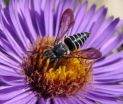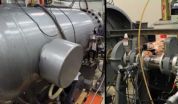(Press-News.org) A new study shows that although certain bumble bees are at risk, other bee species in the northeastern United States persisted across a 140-year period despite expanding human populations and changing land use. Led by Rutgers University and based extensively on historical specimens from the American Museum of Natural History and nine other bee collections, the study informs conservation efforts aimed at protecting native bee species and the important pollinator services they provide. The results are published today in Proceedings of the National Academy of Sciences.
Eighty-seven percent of the world's flowering plants, including most of the leading global food crops, are pollinated by animals. Bees are considered the most important pollinators because of their efficiency, specificity, and ubiquity. However, despite concerns about pollinator declines, long-term data on the status of bee species are scarce.
In the new study, the researchers used new web-based software to compile 30,000 museum specimen records representing 438 bee species.
"A novel aspect of this study was the use of collaborative online tools that allowed data to be captured quickly and accurately across 10 institutions, many of which lacked pre-existing capabilities in this area," said John Ascher, a research scientist in the Museum's Division of Invertebrate Zoology and an author on the paper who led the data-collection effort.
From the years 1872 to 2011, the authors observed slight declines in the number of bee species in comparable samples from the northeastern United States. Statistical analysis revealed that only three species exhibited a rapid and recent population collapse—all species of bumble bees, which also have been shown to be declining in previous studies. Other species, including the oil bee Macropis patellata, showed more gradual declines.
Although few species were found to have severely declined, more than half of all bee species changed in proportion over time, with 29 percent of the species decreasing and 27 percent increasing. Bees that showed the greatest increase are mostly exotic species that were introduced to North America. Few such species were present in the earliest historical samples but they make up an ever-increasing proportion of more recent samples.
"Environmental change affects species differentially, creating 'losers' that decline with increased human activity but also 'winners' that thrive in human-altered environments," said Ignasi Bartomeus, lead author on the paper who conducted this work as a postdoctoral researcher at Rutgers University. "Certain traits can make species more vulnerable."
The scientists found that declining bee species tend to have larger body sizes, restricted diets, and shorter flight seasons.
They also revealed that "southern" bees reaching their northern distributional limits in the Northeast are increasing, a finding that could reflect a response to climate change. The average April temperature increased by more than one degree during the last 40 years in the study region, causing bees and their host plants to emerge earlier in the season.
Ongoing data capture will continue to expand the bee database so that statistical analyses can be applied across a broader geographic area and to a wider range of species, especially those that are rare in collections and potentially of greatest conservation concern.
INFORMATION:
Data capture was supported by a National Science Foundation Biological Infrastructure grant, #0956388. Additional support for this work was provided by Robert G. Goelet, Chairman Emeritus of the Museum's Board of Trustees.
New research confirms plight of bumble bees, persistence of other bees in Northeast
Museum collections key to generating dataset spanning 140 years
2013-03-05
ELSE PRESS RELEASES FROM THIS DATE:
Protein synthesis blocker may hold key to reducing effects of traumatic events
2013-03-05
Reducing fear and stress following a traumatic event could be as simple as providing a protein synthesis blocker to the brain, report a team of researchers from McLean Hospital, Harvard Medical School, McGill University, and Massachusetts General Hospital in a paper published in the March 4 issue of Proceedings of the National Academy of Sciences.
"This is an important basic neuroscience finding that has the potential to have clinical implications for the way individuals with posttraumatic stress disorder are treated," said Vadim Bolshakov, PhD, director of the Cellular ...
Stress hormone foreshadows postpartum depression in new mothers
2013-03-05
Women who receive strong social support from their families during pregnancy appear to be protected from sharp increases in a particular stress hormone, making them less likely to develop postpartum depression, according to a new study published in Clinical Psychological Science, a journal of the Association for Psychological Science.
"Now we have some clue as to how support might 'get under the skin' in pregnancy, dampening down a mother's stress hormone, and thereby helping to reduce her risk for postpartum depression," said Jennifer Hahn-Holbrook, a UCLA National Institute ...
Vitamin deficiency screening needed for refugees
2013-03-05
New research from the University of Adelaide has discovered a high prevalence of vitamin B12 deficiency among refugees, prompting calls for refugees to be routinely screened for the problem soon after they arrive.
Vitamin B12 deficiency is a sign of severe malnourishment and can result in permanent damage to the nervous system. For women of child-bearing age, vitamin B12 deficiency can lead to developmental defects in their unborn children. If left untreated, the deficiency could be fatal.
In the first study of its kind in the world, researchers from the University ...
'True grit' erodes assumptions about evolution
2013-03-05
Dining on field grasses would be ruinous to human teeth, but mammals such as horses, rhinos and gazelles evolved long, strong teeth that are up to the task.
New research led by the University of Washington challenges the 140-year-old assumption that finding fossilized remains of prehistoric animals with such teeth meant the animals were living in grasslands and savannas. Instead it appears certain South American mammals evolved the teeth in response to the gritty dust and volcanic ash they encountered while feeding in an ancient tropical forest.
The new work was conducted ...
MIT researchers develop solar-to-fuel roadmap for crystalline silicon
2013-03-05
CAMBRIDGE, MA -- Bringing the concept of an "artificial leaf" closer to reality, a team of researchers at MIT has published a detailed analysis of all the factors that could limit the efficiency of such a system. The new analysis lays out a roadmap for a research program to improve the efficiency of these systems, and could quickly lead to the production of a practical, inexpensive and commercially viable prototype.
Such a system would use sunlight to produce a storable fuel, such as hydrogen, instead of electricity for immediate use. This fuel could then be used on demand ...
Lawrence Livermore helps find link to arsenic-contaminated groundwater
2013-03-05
Human activities are not the primary cause of arsenic found in groundwater in Bangladesh.
Instead, a team of researchers from Lawrence Livermore National Laboratory, Barnard College, Columbia University, University of Dhaka, Desert Research Institute and University of Tennessee found that the arsenic in groundwater in the region is part of a natural process that predates any recent human interaction, such as intensive pumping.
The results appear in the March 4 edition of the Proceedings of the National Academy of Sciences.
Millions of people in Bangladesh and neighboring ...
BUSM researchers use goal-oriented therapy to treat diabetic neuropathies
2013-03-05
(Boston) – Researchers at Boston University School of Medicine (BUSM) and VA Boston Healthcare System (VA BHS) have found that cognitive behavioral therapy (CBT) can help relieve pain for people with painful diabetic neuropathies. The study, which is the first of its kind to examine this treatment for people with type II diabetes mellitus, is published in the March issue of the Journal of Pain.
Type II diabetes mellitus is the most common form of the disease and affects more than 20 million Americans. The onset of type II diabetes mellitus is often gradual, occurring ...
How the brain loses and regains consciousness
2013-03-05
CAMBRIDGE, MA -- Since the mid-1800s, doctors have used drugs to induce general anesthesia in patients undergoing surgery. Despite their widespread use, little is known about how these drugs create such a profound loss of consciousness.
In a new study that tracked brain activity in human volunteers over a two-hour period as they lost and regained consciousness, researchers from MIT and Massachusetts General Hospital (MGH) have identified distinctive brain patterns associated with different stages of general anesthesia. The findings shed light on how one commonly used ...
NASA Goddard lab works at extreme edge of cosmic ice
2013-03-05
VIDEO:
NASA scientists at the Goddard Cosmic Ice Lab are studying a kind of chemistry almost never found on Earth. The extreme cold, hard vacuum, and high radiation environment of space...
Click here for more information.
Behind locked doors, in a lab built like a bomb shelter, Perry Gerakines makes something ordinary yet truly alien: ice. This isn't the ice of snowflakes or ice cubes. No, this ice needs such intense cold and low pressure to form that the right conditions ...
Sometimes, the rubber meets the road when you don't want it to
2013-03-05
Back in 2010, the ideas behind a squid's sticky tendrils and Spiderman's super-strong webbing were combined to create a prototype for the first remote device able to stop vehicles in their tracks: the Safe, Quick, Undercarriage Immobilization Device (SQUID). At the push of a button, spiked arms shot out and entangled in a car's axles—bringing a racing vehicle to a screeching halt.*
The need to stop vehicles remotely was identified by the law enforcement community. With funding from Homeland Security's Science & Technology Directorate, and the expertise of the engineers ...
LAST 30 PRESS RELEASES:
CU Anschutz School of Medicine receives best ranking in NIH funding in 20 years
Mayo Clinic opens patient information office in Cayman Islands
Phonon lasers unlock ultrabroadband acoustic frequency combs
Babies with an increased likelihood of autism may struggle to settle into deep, restorative sleep, according to a new study from the University of East Anglia.
National Reactor Innovation Center opens Molten Salt Thermophysical Examination Capability at INL
International Progressive MS Alliance awards €6.9 million to three studies researching therapies to address common symptoms of progressive MS
Can your soil’s color predict its health?
Biochar nanomaterials could transform medicine, energy, and climate solutions
Turning waste into power: scientists convert discarded phone batteries and industrial lignin into high-performance sodium battery materials
PhD student maps mysterious upper atmosphere of Uranus for the first time
Idaho National Laboratory to accelerate nuclear energy deployment with NVIDIA AI through the Genesis Mission
Blood test could help guide treatment decisions in germ cell tumors
New ‘scimitar-crested’ Spinosaurus species discovered in the central Sahara
“Cyborg” pancreatic organoids can monitor the maturation of islet cells
Technique to extract concepts from AI models can help steer and monitor model outputs
Study clarifies the cancer genome in domestic cats
Crested Spinosaurus fossil was aquatic, but lived 1,000 kilometers from the Tethys Sea
MULTI-evolve: Rapid evolution of complex multi-mutant proteins
A new method to steer AI output uncovers vulnerabilities and potential improvements
Why some objects in space look like snowmen
Flickering glacial climate may have shaped early human evolution
First AHA/ACC acute pulmonary embolism guideline: prompt diagnosis and treatment are key
Could “cyborg” transplants replace pancreatic tissue damaged by diabetes?
Hearing a molecule’s solo performance
Justice after trauma? Race, red tape keep sexual assault victims from compensation
Columbia researchers awarded ARPA-H funding to speed diagnosis of lymphatic disorders
James R. Downing, MD, to step down as president and CEO of St. Jude Children’s Research Hospital in late 2026
A remote-controlled CAR-T for safer immunotherapy
UT College of Veterinary Medicine dean elected Fellow of the American Academy of Microbiology
AERA selects 34 exemplary scholars as 2026 Fellows
[Press-News.org] New research confirms plight of bumble bees, persistence of other bees in NortheastMuseum collections key to generating dataset spanning 140 years



